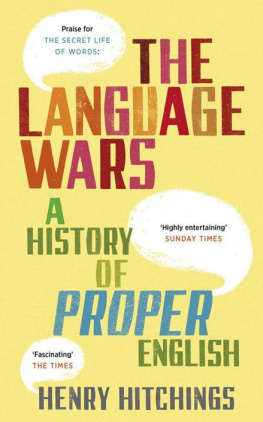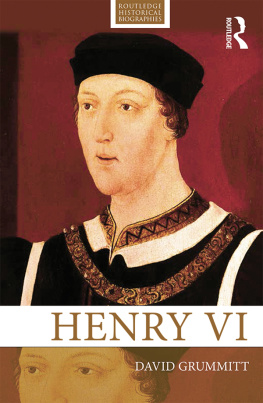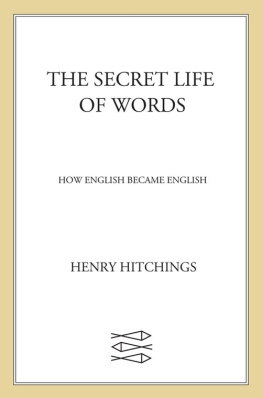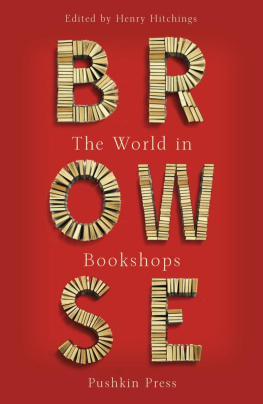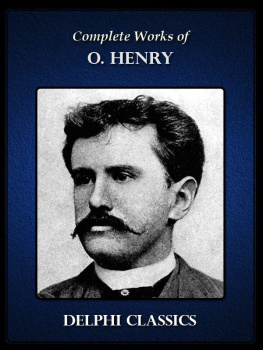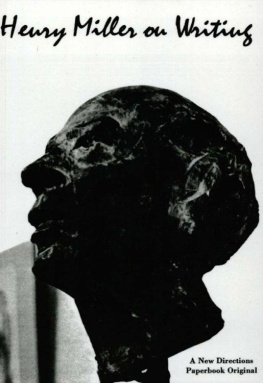Henry Hitchings - The Language Wars
Here you can read online Henry Hitchings - The Language Wars full text of the book (entire story) in english for free. Download pdf and epub, get meaning, cover and reviews about this ebook. year: 2011, publisher: John Murray, genre: Children. Description of the work, (preface) as well as reviews are available. Best literature library LitArk.com created for fans of good reading and offers a wide selection of genres:
Romance novel
Science fiction
Adventure
Detective
Science
History
Home and family
Prose
Art
Politics
Computer
Non-fiction
Religion
Business
Children
Humor
Choose a favorite category and find really read worthwhile books. Enjoy immersion in the world of imagination, feel the emotions of the characters or learn something new for yourself, make an fascinating discovery.
- Book:The Language Wars
- Author:
- Publisher:John Murray
- Genre:
- Year:2011
- Rating:5 / 5
- Favourites:Add to favourites
- Your mark:
- 100
- 1
- 2
- 3
- 4
- 5
The Language Wars: summary, description and annotation
We offer to read an annotation, description, summary or preface (depends on what the author of the book "The Language Wars" wrote himself). If you haven't found the necessary information about the book — write in the comments, we will try to find it.
The Language Wars — read online for free the complete book (whole text) full work
Below is the text of the book, divided by pages. System saving the place of the last page read, allows you to conveniently read the book "The Language Wars" online for free, without having to search again every time where you left off. Put a bookmark, and you can go to the page where you finished reading at any time.
Font size:
Interval:
Bookmark:
Also by Henry Hitchings
Dr Johnsons Dictionary
The Secret Life of Words
Whos Afraid of Jane Austen?
A History of Proper English
HENRY HITCHINGS

www.johnmurray.co.uk
First published in Great Britain in 2011 by John Murray (Publishers)
An Hachette UK Company
Henry Hitchings 2011
The right of Henry Hitchings to be identified as the Author of the Work has been asserted by him in accordance with the Copyright, Designs and Patents Act 1988.
All rights reserved. Apart from any use permitted under UK copyright law no part of this publication may be reproduced, stored in a retrieval system, or transmitted, in any form or by any means without the prior written permission of the publisher.
A CIP catalogue record for this title is available from the British Library
Epub ISBN 978-1-84854-510-6
Book ISBN 978-1-84854-208-2
John Murray (Publishers)
338 Euston Road
London NW1 3BH
www.johnmurray.co.uk
To boldly go
It seems as if no day passes without an argument over the English language and its proper use. We debate the true meanings of words, the nuances of grammar, the acceptability of slang, attitudes to regional accents, resistance to new-fangled terms, confusion about apostrophes, the demise of the semi-colon.
Why do questions of grammar, spelling and punctuation trouble us? Why are we intrigued or unsettled by other peoples pronunciation and vocabulary? Why does the magazine The Awl report the awful rise of snuck, and is the word ilk really, as The Economist counsels, best avoided? Do we laugh or grimace when we see outside the entrance to a friends apartment block a sign reading: Please Ring the Buzzard? What about if the sign says Please, Ring the Buzzard!? Why do we object to someone sighing I could care less rather than asserting I could not care less? What is it that irks people about alleged being vocalized as three syllables rather than two?
The ways in which we and others use language have implications for our relationships, our work and our freedoms. Much of the time we select our words deliberately, and we choose to whom we speak and where we write. We may therefore feel uncomfortable about others less careful use of language.
Perhaps you are feeling uncomfortable right now. You are likely to have spotted those queasy inverted commas around proper in my opening paragraph. Maybe you disapproved of them. I might have deployed them in several other places, save for the suspicion that you would have found them irritating. But immediately we are in the thick of it, in the mle of the language wars. For notions such as proper, true meaning and regional are all contentious.
To sharpen our sense of this contest, Ill introduce a quotation from a novel. One character says, I cannot speak well enough to be unintelligible. Bravo! comes the response. An excellent satire on modern language. When was this novel written? Recently? Twenty years ago, or sixty? Actually, it is Northanger Abbey, written by Jane Austen in the late 1790s.
I cannot speak well enough to be unintelligible. The words, said by Austens teenage heroine Catherine Morland, are not meant to be satirical. They give pleasure now because they present, in miniature, some of the more vexed issues of English usage. Catherine is struck by the indirectness of polite conversation, and sees her own clarity as a mark of being unsophisticated. That strikes a chord: we all have experience of speech and text in which unintelligibility is displayed as though a badge of educational or social refinement. The American academic Alan Sokal has parodied this deliciously, publishing in a scholarly journal a spoof article entitled Transgressing the Boundaries: Towards a Transformative Hermeneutics of Quantum Gravity, which uses smart words to dress up claims about the nonexistence of laws of physics and the need for a multiculturalist understanding of mathematics.
There are other concerns humming in the background of the extract from Jane Austen. Who decides whether someone speaks well? As for well enough is the insufficiency of Catherines speech something perceived by her or by others, and, if the latter, how have they let her know about it? Are there, in fact, any virtues in unintelligibility, or in not being immediately intelligible? To put it another way, are there times when we benefit from expressing ourselves in a warped or aberrant fashion, our individualism saturating our idiom? And what does Henry Tilney, the rather flirtatious clergyman who is the object of Catherines affections, mean by modern language? Austens writing invites this kind of close attention. Ironies are everywhere, and her characters are forever picking their way through the linguistic hazards of polite society.
Next, here is the title of an essay: The Growing Illiteracy of American Boys. When do you suppose it was published? 2010? 1980? In fact this piece was the work of E. L. Godkin, founder of the magazine The Nation, and was published in 1896. Godkin lamented the absence of practical language skills among college students. He
Now, moving back in time to 1712, this is Sir Richard Steele, a usually convivial observer of London life, writing in The Spectator a periodical which influenced eighteenth-century ideas of polite usage, though in its original form it ran for only twenty-one months and sold about 3,000 copies per issue: The scandalous abuse of Language and hardening of Conscience, which may be observed every Day in going from one Place to another, is what makes a whole City to an unprejudiced Eye a Den of Thieves. Here is the same author, the previous year: The Dialect of Conversation is now-a-days so swelled with Vanity and Compliment that if a Man that lived an Age or two ago should return into the World again he would really want a Dictionary to help him to understand his own Language. Finally, here he is in 1713 in a newspaper called The Guardian (no relation of the more famous paper founded by Manchester businessmen in 1821): As the World now goes, we have no adequate Idea of what is meant by Gentlemanly Here is a very pleasant Fellow, a Correspondent of mine, that puts in for that Appellation even to High-way Men.
Reflecting on Steeles complaints, we may well say to ourselves that little has changed in the last three hundred years. But the history of talking about languages imperfections goes back even further than this. It is not exclusive to English. In the first century BC the critic Dionysius of Halicarnassus celebrated recent improvements in oratory by rubbishing the rhetoric of the previous generation; this, he said, was intolerable in its melodramatic shamelessness and possessed of a crudeness that made Greece like the household of some desperate rou, where the decent, respectable wife sits powerless in her own home, while some nitwit of a girl treats her This is the way critics of language use are apt to express themselves; we can quickly lose sight of the fact that they are discussing language, because they deploy such extravagant images.
In the late nineteenth century the American linguist William Dwight Whitney argued that language is an institution. It is the work of those whose wants it subserves; it is in their sole keeping and control; it has been by them adapted to their circumstances and wants, and is still everywhere undergoing at their hands such adaptation. Its elements are the product of a series of changes, effected by the will and consent of men, working themselves out under historical conditions, and conditions of mans nature, and by the impulse of motives, which are, in the main, distinctly traceable. Common assent and custom are, he argues, fundamental to meaning, and at any moment we may experience a kind of amnesia about what the words we employ used to mean and where they came from.
Next pageFont size:
Interval:
Bookmark:
Similar books «The Language Wars»
Look at similar books to The Language Wars. We have selected literature similar in name and meaning in the hope of providing readers with more options to find new, interesting, not yet read works.
Discussion, reviews of the book The Language Wars and just readers' own opinions. Leave your comments, write what you think about the work, its meaning or the main characters. Specify what exactly you liked and what you didn't like, and why you think so.

